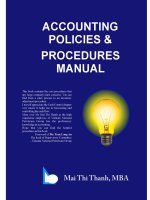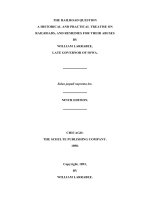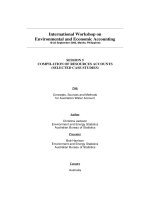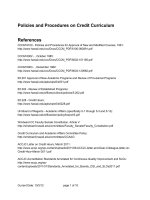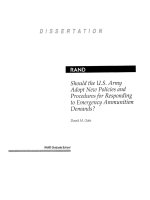MANUAL ON POLICIES AND PROCEDURES FOR PURCHASE OF GOODS pdf
Bạn đang xem bản rút gọn của tài liệu. Xem và tải ngay bản đầy đủ của tài liệu tại đây (654.6 KB, 143 trang )
MANUAL
ON
POLICIES AND PROCEDURES
FOR
PURCHASE OF GOODS
Table of Contents
1 PREAMBLE 1
2 OBJECTIVES AND POLICIES OF PURCHASE 8
3 GENERAL PRINCIPLES OF ENTERING INTO CONTRACTS 14
4 SPECIFICATION AND ALLIED TECHNICAL PARTICULARS OF GOODS 27
5 SOURCES OF SUPPLY AND REGISTRATION OF SUPPLIERS 30
6 MODES OF PURCHASE, RECEIPT AND OPENING OF TENDERS 36
7 EARNEST MONEY AND PERFORMANCE SECURITY 50
8 DELIVERY PERIOD, TERMS OF DELIVERY, TRANSPORTATION,
TRANSIT INSURANCE, DELAY IN SUPPLY,
CANCELLATION OF CONTRACT 53
9 ELEMENTS OF PRICE AND TERMS OF PAYMENT 66
10 QUALITY CONTROL AND INSPECTION OF ORDERED GOODS 78
11 EVALUATION OF TENDERS, FORMULATION OF
PURCHASE PROPOSALAND PLACEMENT OF CONTRACT 85
12 CONTRACT MANAGEMENT 97
13 SETTLEMENT OF DISPUTES 100
14 RATE CONTRACT 102
15 MISCELLANEOUS 112
ANNEXURES 117
1
CHAPTER – 1
PREAMBLE
1.1 Introduction
1.1.1. Objective of this Manual
Every Ministry / Department spends a sizeable amount of its budget for
purchasing various types of goods to discharge the duties and responsibilities
assigned to it. It is imperative that these purchases are made following a
uniform, systematic, efficient and cost effective procedure, in accordance with
the relevant rules and regulations of the Government. The Ministries /
Departments have been delegated powers to make their own arrangements for
procurement of goods under the Delegation of Financial Power Rules, which
have to be exercised in conformity with the orders and guidelines issued by
competent authorities coverings financial, vigilance, security, safety, counter-
trade and other regulatory aspects. Without purporting to be a comprehensive
compendium of all statutory provisions, rules, regulations, orders and
guidelines on the subject of public procurement, this Manual is intended to
serve as a portal to enter this vast area and draw attention to basic norms and
practices governing public procurement.
1.1.2. Transparency, Competition, Fairness and Elimination of Arbitrariness
Public buying should be conducted in a transparent manner to bring
competition, fairness and elimination of arbitrariness in the system. This will
enable the prospective tenderers to formulate competitive tenders with
confidence. The following are some important measures to achieve the same
and, thus, secure best value for money:
(a) The text of the tender document should be user-friendly, self-
contained, comprehensive, unambiguous, and relevant to the
objective of the purchase. The use of terminology used in common
parlance in the industry should be preferred.
2
(b) The specifications of the required goods should be framed giving
sufficient details in such a manner that it is neither too elaborately
restrictive as to deter potential tenderers or increase the cost of
purchase nor too sketchy to leave scope for sub-standard supply.
The specifications must meet the essential requirements of the user
department. Efforts should also be made to use standard
specifications, which are widely known to the industry.
(c) The tender document should clearly mention the eligibility criteria to
be met by the tenderers such as minimum level of experience, past
performance, technical capability, manufacturing facilities, financial
position, ownership or any legal restriction etc.
(d) Restrictions on who is qualified to tender should conform to extant
Government policies and be judiciously chosen so as not to stifle
competition amongst potential tenderers.
(e) The procedure for preparing and submitting the tenders; deadline for
submission of tenders; date, time & place of public opening of
tenders; requirement of earnest money and performance security;
parameters for determining responsiveness of tenders; evaluating
and ranking of tenders and criteria for full or partial acceptance of
tender and conclusion of contract should be incorporated in the
tender enquiry in clear terms.
(f) Tenders should be evaluated in terms of the criteria already
incorporated in the tender document, based on which tenders have
been received. Any new condition, which was not incorporated in the
tender document, should not be brought into consideration while
evaluating the tenders.
(g) Sufficient time should be allowed to the tenderers to prepare and
submit their tenders.
(h) Suitable provisions should be kept in the tender document allowing
the tenderers reasonable opportunity to question the tender
3
conditions, tendering process, and/or rejection of its tender and the
settlement of disputes, if any, emanating from the resultant contract.
(i) It should be made clear in the tender document that tenderers are
not permitted to alter or modify their tenders after expiry of the
deadline for receipt of tender till the date of validity of tenders and if
they do so, their earnest money will be forfeited.
(j) Negotiations with the tenderers must be severely discouraged.
However, in exceptional circumstances, where price negotiations are
considered unavoidable, the same may be resorted to, but only with
the lowest evaluated responsive tenderer, and that too with the
approval of the competent authority, after duly recording the reasons
for such action.
(k) The name of the successful tenderer to whom the supply contract is
awarded should be appropriately notified by the purchase
organization for the information of general public, including display
at notice board, periodical bulletins, website etc.
1.1.3. Efficiency, Economy and Accountability:
Public procurement procedures must conform to exemplary norms of
best practices to ensure efficiency, economy and accountability in the system.
To achieve this objective, the following key areas should be taken care of:
(i) To reduce delays, each Ministry / Department should prescribe
appropriate time frame for each stage of procurement; delineate
the responsibility of different officials and agencies involved in the
purchase process and delegate, wherever necessary, appropriate
purchase powers to the lower functionaries with due approval of
the competent authority.
(ii) Each Ministry / Department should ensure conclusion of contract
within the original validity of the tenders. Extension of tender
validity must be discouraged and resorted to only in absolutely
unavoidable, exceptional circumstances with the approval of the
4
competent authority after duly recording the reasons for such
extension.
(iii) The Central Purchase Organizations should bring into the rate
contract system more and more common user items, which are
frequently needed in bulk by various Ministries / Departments.
The Central Purchase Organizations should also ensure that the
rate contracts remain available without any break.
1.2 Guidelines for Public Procurement
At the apex of the legal framework governing public procurement is
Article 299 of the Constitution, which stipulates that contracts legally binding
on the Government have to be executed in writing by officers specifically
authorized to do so. Further, the Indian Contract Act, 1872 and the Sale of
Goods Act, 1930 are major legislations governing contracts of sale/ purchase of
goods in general. There is no law exclusively governing public procurement of
goods. However, comprehensive rules and directives in this regard are available
in the General Financial Rules (GFR), 2005, especially chapter 6; Delegation of
Financial Powers Rules (DFPR); Government orders regarding price or purchase
preference or other facilities to sellers in the Handloom Sector, Cottage and
Small Scale Industries and to Central Public Sector Undertakings etc. and the
guidelines issued by the Central Vigilance Commission to increase
transparency and objectivity in public procurement. These provide the
regulatory framework for the public procurement system.
1.3 Present Manual
To achieve what has been stated in the above paragraphs, it is essential
that the purchase officials be provided with all the required rules, regulations,
instructions, directives, and guidance on best practices in the form of a
Manual. This Manual is intended to serve this objective. This manual contains
guidelines and directives concerning purchase of goods with public funds as
well as some allied areas such as installation of equipment, operators’ training,
5
after sales services, maintenance contract, etc. Relevant aspects of purchase
management techniques have been incorporated in proper sequence under
separate chapters. The text incorporated in each chapter has been highlighted
with appropriate sub-heads. This arrangement will help the users to readily
locate the desired subjects/sub-subjects.
1.4 Definition of Goods
The term ‘goods’ used in this Manual applies generally to all articles,
material, commodities, livestock, furniture, fixtures, raw material, spares,
instruments, machinery, equipment, industrial plant etc. purchased or
otherwise acquired for the use of Government but excluding books,
publications, periodicals, etc. for a library.
1.5 Terminology and Abbreviations
1.5.1. Standard terminology has been adopted in this Manual. In certain areas,
there may be two or more widely used terminologies bearing the same meaning
as mentioned below:
i) Tender, Bid, Quotation. (Meaning: offer received from a supplier)
ii) Tenderer, Bidder. (Meaning: an entity who seeks to supply goods
by sending tender/bid)
iii) Tender Enquiry Document, Tender Document, Bidding Document.
(Meaning: a detailed document issued by the purchaser specifying
his needs and the requirements that a potential tenderer/bidder
must meet).
iv) Notice Inviting Tenders, Invitation for Bids (Meaning:
advertisement containing brief details of the requirement).
v) Earnest Money Deposit, Bid Security. (Meaning: monetary
guarantee furnished by a tenderer along with its tender)
6
vi) Security Deposit, Performance Security. [Meaning: monetary
guarantee furnished by the successful tenderer for due
performance of the contract concluded with it.]
1.5.2. Standard Abbreviations have been used in this Manual. Some important
abbreviations are listed below for ready reference:
ACASH Association of Corporations and APEX Societies of Handlooms
A/T Acceptance of Tender
ATI Advertised Tender Enquiry
BG Bank Guarantee
BL Bill of Lading
CD Custom Duty
CIF Cost, Insurance & Freight
CIP Carriage and Insurance Paid
CPSU Central Public Sector Undertaking
DGS&D Directorate General of Supplies & Disposals
DP Delivery Period
ED Excise Duty
EMD Earnest Money Deposit
FAS Free Alongside Ship
FM Force Majeure
FOB Free On Board
FOR Free On Rail
INCOTERMS International Commercial Terms
KVIC Khadi Village Industries Commission
LC Letter of Credit
LD- Liquidated Damages
LPP Last Purchase Price
LSI Large Scale Industries
LTI Limited Tender Enquiry
7
NSIC National Small Scale Industries Corporation
NTH National Test House
PO Purchase Order
PSU Public Sector Undertaking
RC Rate Contract
RR Railway Receipt
SO Supply Order
SSI Small Scale Industries
ST Sales Tax
STI Single Tender Inquiry
TPC Tender Purchase Committee
VAT Value Added Tax
WDO Women’s Development Organization
1.6 Standard Tender Enquiry Documents
The Ministries / Departments should use standard forms of tender
enquiry documents and contracts in line with the extant rules, regulations,
directives, procedures etc. A set of standard documents may be kept updated
for this purpose by each office, broadly following the standard documents
prescribed by higher authorities and customizing these standard templates to
suit specific requirements. Supervisory authorities would prescribe the kind of
alterations permitted in the standard templates and the cases where deviations
from the standard provisions can be made with appropriate legal and financial
advice.
x
8
CHAPTER – 2
OBJECTIVES AND POLICIES OF PURCHASE
2.1 Fundamental Principles of Public Buying
It may be useful to refer to the following provisions in the General
Financial Rules, 2005:
Rule 137. Fundamental principles of public buying : Every authority
delegated with the financial powers of procuring goods in public interest shall
have the responsibility and accountability to bring efficiency, economy,
transparency in matters relating to public procurement and for fair and equitable
treatment of suppliers and promotion of competition in public procurement.
The procedure to be followed in making public procurement must conform to the
following yardsticks :-
(i) the specifications in terms of quality, type etc., as also quantity of goods to be
procured, should be clearly spelt out keeping in view the specific needs of the
procuring organizations. The specifications so worked out should meet the basic
needs of the organization without including superfluous and non-essential
features, which may result in unwarranted expenditure. Care should also be
taken to avoid purchasing quantities in excess of requirement to avoid inventory
carrying costs;
(ii) offers should be invited following a fair, transparent and reasonable
procedure;
(iii) the procuring authority should be satisfied that the selected offer adequately
meets the requirement in all respects;
(iv) the procuring authority should satisfy itself that the price of the selected offer
is reasonable and consistent with the quality required;
(v) at each stage of procurement the concerned procuring authority must place
on record, in precise terms, the considerations which weighed with it while taking
the procurement decision.
2.2 Authorities competent to purchase goods and their Purchase Powers
2.2.1 An authority which is competent to incur contingent expenditure may
sanction the purchase of goods required for use in public service in
accordance with Schedule V of the Delegation of Financial Rules, 1978,
following the general procedure contained in this Manual.
2.2.2 A demand should not be split into small quantities for the sole purpose
of avoiding the necessity of taking approval of the higher authority
required for sanctioning the purchase of the original demand.
9
2.3 Purchase through a Central Purchase Organization
In case a Ministry / Department does not have the required expertise or
manpower, it may send its indent to the Central Purchase Organization (e.g.,
DGS&D) with the approval of its Secretary. The indent form to be utilized for
this purpose will be as per the standard form evolved by the Central Purchase
Organization.
2.4 Preferential/Mandatory Purchase from certain sources Product
Reservation
i) Khadi Goods/Handloom Textiles: The Central Government has
reserved all items of hand-spun and hand-woven textiles (Khadi goods) for
exclusive purchase from Khadi & Village Industries Commission (KVIC).
Government has also reserved all items of handloom textiles including Barrack
Blankets for exclusive purchase from KVIC or notified handloom units through
the Association of Corporations and Apex Societies of Handlooms (ACASH) and
Women’s Development Organization (WDO). The handloom textile items are to
be purchased from KVIC to the extent they can supply and the balance from
the handloom units of ACASH, to the extent these units can make supplies.
Left over quantity, if any, may be purchased from other sources. In the case of
KVIC, the rates are fixed by certification committee, and the rates so fixed are
reviewed by the Cost Accounts Branch of the Ministry of Finance. In the case of
ACASH, the final price will be calculated by ACASH and fixed by the Ministry of
Textiles by associating a representative of the Chief Accounts Office of
Department of Expenditure, Ministry of Finance. The Central Purchase
Organization (e.g. DGS&D) also enters into long term contracts with KVIC and
ACASH for items of recurrent demands and lays down terms and conditions
therein. For other items, the purchase from both KVIC and ACASH should be
made on single tender basis. Normal inspection and other procedures shall
apply for procurement through KVIC/ ACASH. Testing arrangements will be
provided by KVIC/ ACASH or by their notified units and where the same are
10
not available; testing charges for testing outside at approved laboratory should
be borne by KVIC/ ACASH/ their units. All relevant details in this regard are
available with DGS&D.
ii) Reserved Products of SSI: The Government has also reserved some items
for exclusive purchase from Small Scale Sector. The Ministries/Departments
are to purchase such products from these notified agencies/suppliers only. The
Government reviews the lists of such reserved items and the applicable
procedures for purchasing the same from time to time. The tender enquiry
document should clearly indicate that the purchase will be made from the
suppliers falling in the category of KVIC, ACASH, and Small Scale Units
registered with National Small Industries Corporation (NSIC). In the process of
procurement, other things being equal, the purchase preference would be in
favour of KVIC/ACASH/SSI in that order. (Note: KVIC and ACASH are treated
on par with SSI units registered with NSIC and DGS&D.)
Special dispensation available to Kendriya Bhandar (KB) and National
Consumer Cooperative Federation (NCCF) for procurement of stationery and
consumables before the introduction of GFRs 2005, which has since been
terminated, is under review. While making purchase of goods falling in these
categories, the purchase organization should check the latest directives in this
regard for necessary action.
2.5 Price Preference
As per the extant rules, when acceptable offers are received against an
ad-hoc requirement of unreserved goods (i.e. goods not covered under para 2.4
above) from various categories of suppliers, including Large Scale Sector,
Public Sector Undertakings and Small Scale Sector, the offer from the Small
Scale Sector, which is registered with National Small Industries Corporation
(NSIC) or with Directorate General of Supply and Disposal (DGS&D) is entitled
for price preference upto 15% over the offer of Large Scale Sector and 5% over
the offer of Public Sector Undertaking, provided the offers under consideration
are otherwise clear for acceptance in all respects.
11
(Example: The evaluated cost of the lowest acceptable offer, which is from a
Large Scale Sector is Rs.100/ The evaluated cost of an acceptable offer from a
Small Scale Unit, which is registered with NSIC / DGS&D is Rs.115/ This SSI
is entitled to get the order at its quoted price).
However, the price preference admissible to the SSI unit is not
mandatory. It is to be decided separately for each tender on merits of each
case, in consultation with Finance, and a mention to that effect should be
made in the Notice Inviting Tenders (NIT)/Request for Proposal (RFP). The price
preference is accorded to the deserving SSI units as an incentive to grow; but it
should not promote inflation, profiteering or misuse of SSI units as conduits. In
case the SSI unit in view has established itself as a supplier of the required
goods on competitive terms and enjoys advantage(s) over Large Scale Sector, no
price preference need be considered.
Where the NSIC / State Development Corporations themselves quote on
behalf of some SSI units, such offers will be considered as offers from SSI units
registered with the DGS&D/NSIC.
An SSI Unit will not get any price preference over another SSI Unit.
Price preference facility to SSI Units will, however, not apply to the
procurement of the under mentioned goods: -
i) Paint items for the Railways
ii) Drug items
iii) Medical and Electro-medical equipment
iv) Requirements of Defence, where inspection is to be carried out by the
Defence Inspection Organization.
v) Items where technical competence, capacity and manufacturing facilities
are required to be verified before placement of order.
Before considering any price preference to Small Scale Sector, the
purchase organization should check the latest directives in this regard for
necessary action.
12
2.6 Purchase Preference to Central Public Sector Undertakings
As per the extant government policy, the Central Public Sector
Undertaking (CPSU) gets purchase preference upto 10% over the Large Scale
Private Units (vide Department of Public Enterprises O.M. No.
DPE.13(12)/2003-Fin.Vol.II dated 18.7.2005).
Example: Against an ad-hoc requirement, the evaluated cost of the
lowest acceptable offer, which is from a Large Scale Sector is Rs.100/ The
evaluated cost of an acceptable offer from a CPSU, is Rs.110/ As per the
extant policy, the CPSU will be offered the price of Rs.100/- and if it accepts
the same, order will be placed on it (CPSU) at that price (Rs.100/-).
Preferential purchase policy for certain medicines: Government has
approved (vide Department of Chemicals & Petrochemicals OM No.
50013/1/2006-SO(PI-IV) dated 7th August, 2006) grant purchase preference
exclusively to Pharma CPSEs and their subsidiaries in respect of 102 specified
medicines manufactured by them. The salient features of this Purchase
Preference Policy (PPP) are as under:
i) PPP in respect of a maximum of 102 medicines would be applicable to
purchases made by Ministries / Departments, PSUs, Autonomous
Bodies, etc. of the Central Government It would be valid for a period of
five years.
ii) This would also be applicable to purchase of 102 drugs made by State
Governments under health programmes which are funded by
Government of India. (e.g. purchases under National Rural Health
Mission etc)
iii) PPP will extend only to Pharma CPSEs and their subsidiaries (i.e. where
Pharma CPSEs own 51 % or above shareholding).
iv) It would be applicable to a maximum of 102 medicines, The list of 102
medicines would be reviewed and revised by Department of Chemicals &
Petrochemicals as and when required taking care not to include any item
reserved for SSI units.
13
v) The Purchasing Departments / PSUs / autonomous bodies etc. of the
Central Government may invite limited tenders from Pharma CPSEs and
their subsidiaries or purchase directly from them at NPPA certified /
notified price with a discount upto 35%.
vi) The purchasing departments would purchase from Pharma CPSEs and their
subsidiaries subject to their meeting Good Manufacturing Practices
(GMP) norms as per Schedule ‘M’ of the Drugs & Cosmetic Rules. If no
Pharma CPSE is forthcoming to supply these 102 medicines, the
purchasing departments would be at liberty to purchase from other
manufacturers.
vii) If the Pharma CPSEs or their subsidiaries which have the benefit of PPP,
fail to perform as per the purchase order, they would be subject to
payment of liquidated damages or any other penalty included in the
contract
viii)The medicines covered under Drug & Price Control Order (DPCO) would be
supplied at the rates fixed by National Pharmaceuticals Pricing Authority
(NPPA) rates minus discount up to 35 per cent.
ix)In case of medicines not covered under DPCO, prices would be got certified
from NPPA, only for the limited purpose of supply to Central Government
Departments and their Public Sector Undertakings, autonomous bodies
etc. On the certified price, Pharma CPSEs and their subsidiaries would
provide discount up to 35%.
x) The Purchase Preference Policy (PPP) as contained in Department of Public
Enterprises O.M. No. DPE.13(12)/2003-Fin.Vol.ll dated 18.7.2005 would
not be applicable to Pharma CPSEs.
Before considering any such purchase preference, the purchase
organization should check the latest directives in this regard for
necessary action. Purchase Preference provision shall invariably be part of
the Notice Inviting Tender (NIT).
x
14
CHAPTER – 3
GENERAL PRINCIPLES OF ENTERING INTO CONTRACTS
3.1 Introduction
The elements and principles of contract law and the meaning and import
of various legal terms used in connection with the contracts are available in the
Indian Contract Act, 1872 read with the Sale of Goods Act, 1930. Some of the
salient principles relating to contracts are set out briefly in this chapter.
3.2 Elementary Legal Practices
3.2.1 What is a Contract? The proposal or offer when accepted is a promise, a
promise and every set of promises forming the consideration for each
other is an agreement, and an agreement if made with free consent of
parties competent to contract, for a lawful consideration and with a
lawful object is a contract.
3.2.2 Proposal or Offer: When one person signifies to another his willingness
to do or to abstain from doing anything, with a view to obtaining the
assent of the other to such act or abstinence, he is said to make a
proposal or offer. In a sale or purchase by tender, the tender signed by
the tenderer is the proposal. The invitation to tender and instructions to
tenderers do not constitute a proposal.
3.2.3 Acceptance of the Proposal: When the person to whom the proposal is
made signifies his assent thereto, the proposal is said to be accepted. A
proposal when accepted becomes a promise.
3.2.4 What agreements are contracts: An agreement is a contract enforceable
by law when the following are satisfied. A defect affecting any of these
renders a contract un-enforceable.
15
(a) Competency of the parties
(b) Freedom of consent of both parties
(c) Lawfulness of consideration
(d) Lawfulness of object
3.3 Competency of Parties
Under law any person who has attained majority and is of sound mind or
not debarred by law to which he is subject, may enter into contracts. It,
therefore, follows that minors and persons of unsound mind cannot enter into
contracts nor can insolvent person do so.
3.3.1 Categories of persons and bodies who are parties to the contract may be
broadly sub-divided under the following heads: -
(a) Individuals
(b) Partnerships
(c) Limited Companies
(d) Corporations other than limited companies
(a) Contracts with Individuals: Individuals tender either in their own name
or in the name and style of their business. If the tender is signed by any
person other than the concerned individual, the authority of the person
signing the tender on behalf of another must be verified and a proper
power of attorney authorizing such person should be insisted on. In case,
a tender is submitted in a business name and if it is a concern of an
individual, the constitution of the business and the capacity of the
individual must appear on the face of the contract and the tender signed
by the individual himself as proprietor or by his duly authorized
attorney.
(b) Contracts with Partnerships: A partnership is an association of two or
more individuals formed for the purpose of doing business jointly under
16
a business name. It is also called a firm. It should be noted that a
partnership is not a legal entity by itself, apart from the individuals
constituting it. A partner is the implied authority to bind the firm in a
contract coming in the purview of the usual business of the firm. The
implied authority of a partner, however, does not extend to enter into
arbitration agreement on behalf of the firm. While entering into a
contract with partnership firm care should be taken to verify the
existence of consent of all the partners to the arbitration agreement.
(c) Contracts with Limited Companies: Companies are associations of
individuals registered under Companies Act in which the liability of the
members comprising the association is limited to the extent of the shares
held by them in such companies. The company, after its incorporation or
registration, is an artificial legal person which has an existence quite
distinct and separate from the members of shareholders comprising the
same. A company is not empowered to enter into a contract for purposes
not covered by its memorandum of association; any such agreement in
excess of power entered into the company is void and cannot be enforced.
Therefore, in cases of doubt, the company must be asked to produce its
memorandum for verification or the position may be verified by an
inspection of the memorandum from the office of the Registrar of
Companies before entering into a contract. Normally, any one of the
Directors of the company is empowered to present the company. Where
tenders are signed by persons other than Directors or authorized
Managing Agents, it may be necessary to examine if the person signing
the tender is authorized by the company to enter into contracts on its
behalf.
(d) Corporation other than Limited Companies: Associations of
individuals incorporated under statutes such as Trade Union Act, Co-
operative Societies Act and Societies Registration Act are also artificial
17
persons in the eye of law and are entitled to enter into such contracts as
are authorized by their memorandum of association. If any contract has
to be entered into with any one or such corporations or associations, the
capacity of such associations to enter into contract should be verified
and also the authority of the person coming forward to represent the said
Association.
3.4 Consent of both Parties
Two or more persons are said to consent when they agree upon the same
thing in the same sense. When two persons dealing with each other have their
minds directed to different objects or attach different meanings to the language
which they use, there is no agreement. The misunderstanding which is
incompatible with agreement, may occur in the following cases: -
(a) When the misunderstanding relates to the identity of the other
party to the agreement;
(b) When it relates to the nature or terms of the transactions;
(c) When it related to the subject matter of the agreement.
3.5 Free consent of both Parties
3.5.1 The consent is said to be free when it is not caused by coercion, undue
influence, fraud, mis-representation or mistake. Consent is said to be so
caused when it would not have been given but for the existence of
coercion, undue influence, fraud, mis-representation or mistake. When
consent to an agreement is caused by coercion, undue influence, fraud
or misrepresentation, the agreement is a contract voidable at the option
of the party whose consent was caused. A party to a contract, whose
consent was caused by fraud or misrepresentation may, if he thinks fit,
insist that the contract shall be performed, and that he shall be put in
the position in which he would have been if the representations made
had been true.
18
3.5.2 In case consent to an agreement has been given under a mistake, the
position is slightly different. When both the parties to an agreement are
under a mistake as to a matter essential to the agreement, the agreement
is not voidable but void. When the mistake is unilateral on the part of
one party only, the agreement is not void.
3.5.3 Distinction has also to be drawn between a mistake of fact and a mistake
of law. A contract is not void because it was caused by a mistake as to
any law in force in India but a mistake as to law not in force in India has
the same effect as a mistake of fact.
3.6 Consideration
Consideration is something which is advantageous to the promisor or
which is onerous or disadvantageous to the promisee. Inadequacy of
consideration is, however, not a ground avoiding the contract. But an act,
forbearance or promise which is contemplation of law has no value is no
consideration and likewise an act or a promise which is illegal or impossible
has no value.
3.7 Lawfulness of object
The consideration or object of an agreement is lawful, unless it is
forbidden by law or is of such a nature that if permitted, it would defeat the
provisions of any law, or is fraudulent or involves or implies injury to the
fraudulent property of another or the court regards it as immoral or opposed to
public policy. In each of these cases the consideration or object of an
agreement is said to be unlawful.
3.8 Communication of an Offer or Proposal
The communication of a proposal is complete when it comes to the
knowledge of the person to whom it is made. A time is generally provided in the
19
tender forms for submission of the tender. Purchaser is not bound to consider
a tender, which is received beyond that time.
3.9 Communication of Acceptance
A date is invariably fixed in tender forms upto which tenders are open for
acceptance. A proposal or offer stands revoked by the lapse of time prescribed
in such offer for its acceptance. If, therefore, in case it is not possible to decide
a tender within the period of validity of the offer as originally made, the consent
of the tenderer firm should be obtained to keep the offer open for further period
or periods.
3.9.1 The communication of an acceptance is complete as against the proposer
or offerer, where it is put in the course of transmission to him, so as to be out
of the power of the acceptor, and it is complete as against the acceptor when it
comes to the knowledge of the proposer or offerer. The medium of
communication in government contracts is generally by post and the
acceptance is, therefore, complete as soon as it is posted. So that there might
be no possibility of a dispute regarding the date of communication of
acceptance, it should be sent to the correct address by some authentic
foolproof mode like registered post acknowledgement due, etc.
3.10 Acceptance to be identical with Proposal
If the terms of the tender or the tender, as revised, and modified, are not
accepted or if the terms of the offer and the acceptance are not the same, the
acceptance remains a mere counter offer and there is no concluded contract. It
should, therefore, be ensured that the terms incorporated in the acceptance are
not at variance with the offer or the tender and that none of the terms of the
tender are left out. In case, uncertain terms are used by the tenderers,
clarifications should be obtained before such tenders are considered for
acceptance. If it is considered that a counter offer should be made, such
20
counter offer should be carefully drafted, as a contract is to take effect on
acceptance thereof.
If the subject matter of the contract is impossible of fulfillment or is in
itself in violation of law such contract is void.
3.11 Withdrawal of an Offer or Proposal
A tenderer firm, who is the proposer may withdraw its offer at any time
before its acceptance, even though the firm might have offered to keep the offer
open for a specified period. It is equally open to the tenderer to revise or modify
his offer before its acceptance. Such withdrawal, revision or modification must
reach the accepting authority before the date and time of opening of tender.
No legal obligations arise out of such withdrawal or revision or
modification of the offer as a simple offer is without a consideration. Where,
however, a tenderer agrees to keep his offer open for a specified period for a
consideration, such offers cannot be withdrawn before the expiry of the
specified date. This would be so where earnest money is deposited by the
tenderer in consideration of his being supplied the subsidiary contract and
withdrawal of offer by the tenderer before the specified period would entitle the
purchaser to forfeit the earnest money.
3.12 Withdrawal of Acceptance
An acceptance can be withdrawn before such acceptance comes to the
knowledge of the tenderer. A telegraphic revocation of acceptance, which
reaches the tenderer before the letter of acceptance, will be a valid revocation.
3.13 Changes in terms of a concluded Contract
No variation in the terms of a concluded contract can be made without
the consent of the parties. While granting extensions or making any other
variation, the consent of the contractor must be taken. While extensions are to
be granted on an application of the contractor, the letter and spirit of the
application should be kept in view in fixing a time for delivery.
21
3.14 Discharge of Contracts
A contract is discharged or the parties are normally freed from the
obligation of a contract by due performance of the terms of the contract. A
contract may also be discharged: -
(a) By mutual agreement: If neither party has performed the
contract, no consideration is required for the release. If a party has
performed a part of the contract and has undergone expenses in
arranging to fulfill the contract it is necessary for the parties to
agree to a reasonable value of the work done as consideration for
the value.
(b) By breach: In case a party to a contract breaks some stipulation in
the contract which goes to the root of transaction, or destroys the
foundation of the contract or prevents substantial performance of
the contract, it discharges the innocent party to proceed further
with the performance and entitles him to a right of action for
damages and to enforce the remedies for such breach as provided
in the contract itself. A breach of contract may, however, be
waived.
(c) By refusal of a party to perform: On a promisor’s refusal to
perform the contract or repudiation thereof even before the arrival
of the time for performance, the promisee may at his option treat
the repudiation as an immediate breach putting an end to the
contract for the future. In such a case the promisee has a right of
immediate action for damages.
(d) In a contract where there are reciprocal promises: If one party
to the contract prevents the other party from performing the
contract, the contract may be put to an end at the instance of the
party so prevented and the contract is thereby discharged.

